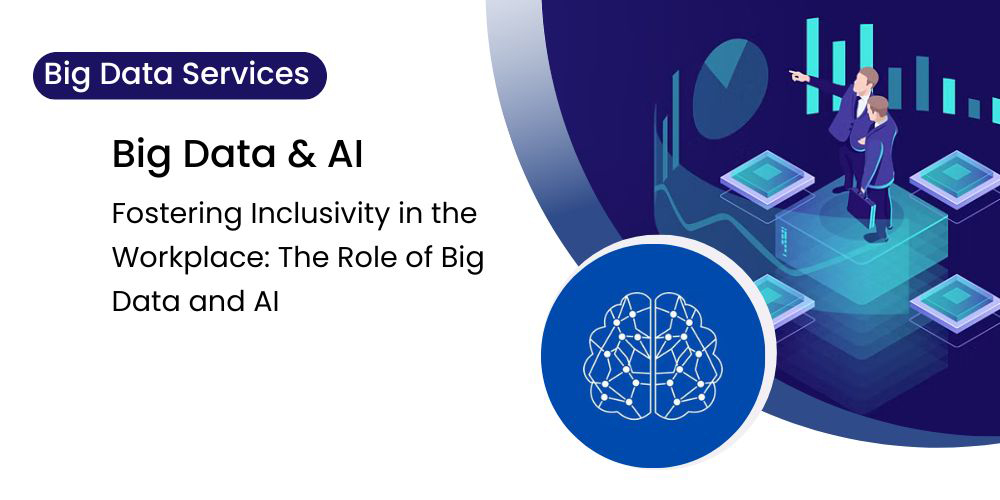
In the dynamic realm of contemporary firms, the clarion call for diversity, equity, and inclusion has transformed from an aspiration to a strategic imperative. Corporations have been confronted with the urgency to shatter the barriers that perpetuate disparity and cultivate an environment where every individual experiences a profound sense of belonging.
In this epoch of technological prowess, the amalgamation of big data services and artificial intelligence has emerged as an unprecedented catalyst for reshaping the narrative of inclusivity within workspaces.
This discourse will embark on an exploration of AI's formidable potential in sculpting multifaceted and inclusive workplaces. By delving into the mettle of AI's transformative role and its cascading ramifications across facets like recruitment, onboarding, accessibility, leadership decisions, communication, and ethical considerations, we traverse the realm of innovation in pursuit of an equitable professional ecosystem.
AI's Metamorphic Prowess: A New Dawn Of Inclusivity
Diversity and inclusion have become pivotal issues in the modern workplace. Firms are striving to construct environments where employees from diverse backgrounds feel welcomed, valued, and able to perform at their best. Emerging technologies like big data analytics and artificial intelligence will find new paths to enhance diversity and inclusion through data-driven insights.
Beyond the confines of rote automation, AI has been emerging as a paradigm-shattering force capable of redefining traditional paradigms, opening up untrodden avenues of insight, and coalescing into an agent of equitable recruitment, seamless onboarding, and dynamic workplace metamorphosis.
AI-Driven Recruitment And Onboarding: Mitigating Bias For A Just Elevation
Ingrained bias often permeates the recruitment process, skewing the trajectory of inclusion. By harnessing AI's analytical acumen, firms can recalibrate this landscape. AI-fueled tools expunge potentially prejudiced facets like names, genders, or ethnicities from resumes, thus metamorphosing the evaluation criteria to focus unerringly on qualifications.
The linguistic underpinnings of job descriptions will also harbor latent biases. AI intervenes by unearthing language choices that may inadvertently deter a diverse talent pool. Subsequently, the recruitment process will transmute into a more meritocratic journey, making fairness its cornerstone.
Onboarding, a pivotal point in the employee lifecycle, will assume enhanced significance through AI-driven personalization. Tailoring onboarding content based on individual profiles will accelerate the assimilation process, fostering an immediate sense of belonging.
Crafting An Inclusive Tapestry Through AI
AI's pervasive influence will extend beyond the preliminary phases of the employee journey to imbue inclusivity within the fabric of corporate culture. Addressing communication, accessibility, and employee engagement, AI will shape new dimensions of inclusivity.
AI-powered sentiment analysis will add a discerning layer to corporate communications. Detection of exclusionary rhetoric facilitates proactive rectification, channeling communications towards all-encompassing dialogues that factor in the dynamics of a heterogeneous workforce.
AI's utility in enhancing accessibility remains unrivaled. Speech recognition, real-time transcription, and text-to-speech applications cast a wide net of inclusion, enabling seamless communication for individuals with diverse abilities.
A notable trailblazer in AI-powered inclusivity solutions will make sure to fill a pronounced gap. Correct name pronunciation often trivialized, metamorphoses into a salient avenue of respect. This tool eviscerates the discomfort arising from mispronunciations, forging bonds of inclusivity right from the outset.
AI Chatbots For Inclusive HR Support
Intelligent chatbots will provide anonymous and unbiased support. Employees hesitant to speak to HR can voice concerns to a chatbot. It can offer guidance on raising complaints, reporting harassment, seeking mentors, or joining employee resource groups. Chatbots are always accessible to address employee queries in real-time.
AI At The Helm Of Leadership And Succession Planning: Forging A Leveling Paradigm
Analytics help assess the impact of diversity and inclusion programs. Participation rates in diversity events, sentiment analysis from employee surveys, and utilization of family benefits can quantify engagement.
Network analysis graphs can map connections between diverse teams to measure collaboration. Big data services provides tangible metrics to demonstrate ROI on D&I investments and steer strategy.
AI permeates the hallowed corridors of leadership and succession planning, ushering in objectivity and eradicating latent biases. Performance evaluations, driven by AI, furnish an objective, data-driven prism through which an employee's accomplishments and growth areas are adjudged. This data-driven perspective will mitigate subjective biases that often taint traditional evaluations.
Leadership potential hinges on cultivating talent from diverse backgrounds. AI spotlights these talents and implements personalized strategies to bolster engagement and retention, accentuating inclusivity's bedrock role.
Moreover, AI reshapes the realm of succession planning. By distilling leadership potential through the crucible of hard metrics and skill assessments, AI neutralizes unconscious biases, shaping an unassailably diverse leadership pipeline.
Navigating The Ethical Nexus Of AI And Inclusivity
The elixir of AI's promise must be balanced with ethical vigilance. Several vital considerations underscore the ethical dimension of AI in promoting inclusivity:
- Taming Bias Amplification: AI's veneer of objectivity can inadvertently perpetuate societal biases, fostering discrimination and exclusion. Safeguarding against algorithmic biases is an ethical imperative.
- Guarding Privacy Precincts: AI's insatiable hunger for data fuels its insights. However, ethical data collection, transparent usage, and impervious cybersecurity measures are prerequisites to preventing data breaches and privacy transgressions.
- Transparency And Accountability: The evolving complexity of AI systems renders understanding their decision-making rationale a Herculean task. Ensuring transparency mechanisms for these systems is a foundational ethical mandate.
- Ongoing Scrutiny And Evaluation: The evolving landscape of AI demands rigorous evaluation protocols. Periodic assessments must gauge AI's efficacy in bolstering diversity and inclusion, safeguarding its intended positive impact.
Wrapping Up:
Emerging technologies open new possibilities for organizations to foster diversity and inclusion. However, they require thoughtful implementation with transparency and employee consent to avoid overreach or infringement of rights. With a human-centric approach, data and AI can help create more welcoming and equitable workplaces where everyone thrives.
In summation, the nexus of big data and AI forges a gateway to workplaces replete with diversity's kaleidoscope, equity's symmetry, and inclusion's embrace. By orchestrating AI's prowess across recruitment, communication, leadership, and ethical considerations, businesses venture forth into a realm of inclusivity hitherto unparalleled. This voyage, albeit intricate, is enriched by the aegis of pioneering solutions as organizations endeavor to script a future that embraces all voices, perspectives, and narratives.